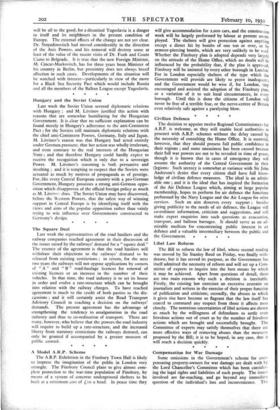Hungary and the Soviet Union Last week the Soviet Union
severed diplomatic relations with Hungary ; and M. Litvinov justified this action with reasons that are somewhat humiliating for the Hungarian Government. It is clear that no sufficient explanation can be found merely in Hungary's adherence to the anti-Comintern Pact ; for the Soviets still maintain diplomatic relations with the chief anti-Comintern Powers, Germany, Italy and Japan. M. Litvinov's reason was that Hungary had acted entirely under German pressure; that her action was wholly irrelevant, and even contrary to the real interests of the Hungarian State ; and that therefore Hungary could hardly expect to receive the recognition which is only due to a sovereign Power. M. Litvinov's reasoning is both persuasive and insulting ; and it is tempting to suspect that the Soviets were actuated as much by motives of propaganda as of prestige. For, like every Central European country with a pro-German Government, Hungary possesses a strong anti-German oppo- sition which disapproves of the official foreign policy as much as M. Litvincrr does. The Soviet Union may have discovered, before the Western Powers, that the safest way of winning support in Central Europe is by identifying itself with the views and aims of the popular opposition rather than vainly trying to win influence over Governments constructed to Germany's design.














































 Previous page
Previous page